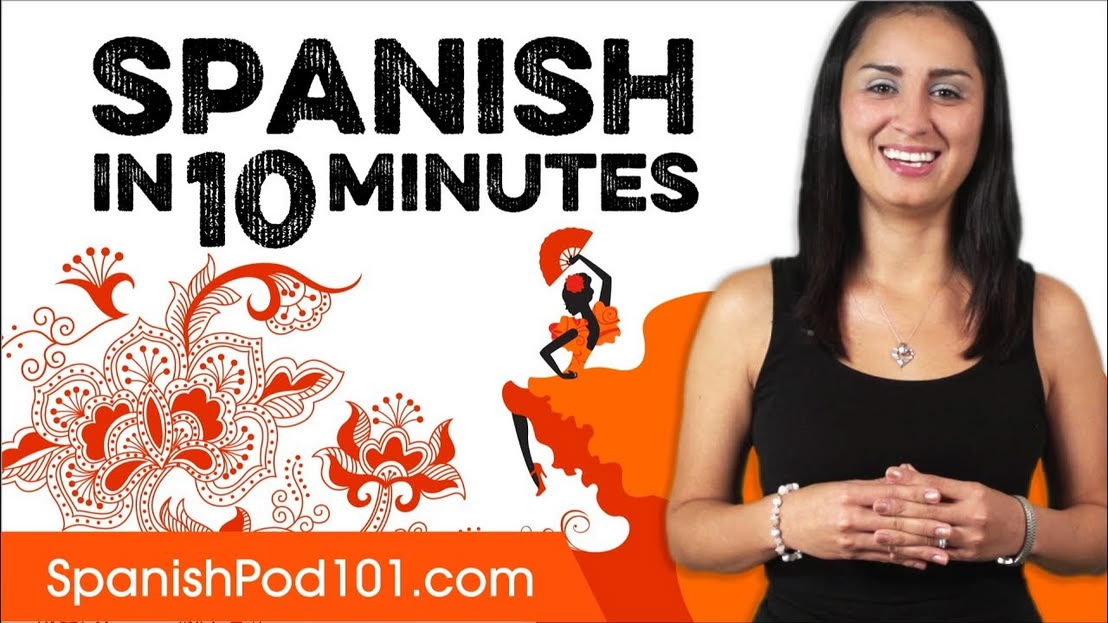Tips and Tricks to Learning Spanish: How to Learn Spanish Successfully
There are currently about 20 million people in the world who are actively learning Spanish. You too can become part of this huge community. Learning Spanish will bring you many benefits. You will be able to communicate in more than 30 different Spanish-speaking countries and communicate with the 523 million native Spanish speakers.
In the following paragraphs, we will introduce you to tips and tricks to learn Spanish. In addition, we will answer any questions you may have about learning Spanish and give you a guide that will help you learn the language successfully. So don't hesitate and start the adventure of learning Spanish!
On this page you will find ...
1. How you can learn Spanish specifically for your level.
2. What tools can help you learn Spanish successfully.
3. Answers to your questions about learning Spanish.
Tips for learning Spanish for every language level
Learning a new language can become very stressful without proper learning strategies and methods. This is true for learning Spanish too. Therefore, we'll give you some tips and ideas to help you learn Spanish quickly and effectively. You'll find helpful hints and study ideas below for each language level. For determining the language level, we used the Common European Framework of Reference for Languages (CEFR).
Learn Spanish for Beginners (A-Level)
Often, beginners often ask themselves how they can best start learning Spanish. The best thing to do is to focus on pronunciation, grammar and basic vocabulary. In the following we have compiled some tips for these areas.
Pronunciation: There are some peculiarities in Spanish pronunciation that you need to understand at the beginning. You should familiarize yourself with the specifics and practice it. The best way to practice pronunciation is to simply read texts aloud or repeat dialogues.
Basic grammar rules: When it comes to formulating your first Spanish sentences, learning basic grammar rules is very important. You should also learn how to conjugate Spanish verbs as early as possible. When conjugating Spanish verbs, with the exception of some irregular verbs, there are fixed rules that you should understand at the beginning. Building up a good basic grammatical knowledge will make your life easier in the later more complex grammatical lessons.
Basic vocabulary: When learning a new language, it is very important to build up vocabulary from the beginning. Without a good vocabulary, it will be difficult for you to understand texts. Therefore, especially as a beginner, you should spend time adding new words to your vocabulary. At first, you should concentrate on words and phrases of everyday use. This way, you will be able to understand simple texts and follow easy dialogues after a short time.
As soon as you have understood the basic rules of pronunciation, grammar and vocabulary, you can begin to understand simple dialogues and short texts. This way you can check your understanding of basic grammatical rules.
Learn Spanish for advanced students (B-level)
Even if you have a good command of the language, you should focus on improving your grammar skills and extending your vocabulary. As an advanced student, you can apply more sophisticated grammatical rules when learning grammar. You can also begin conjugating irregular verbs after you have developed your fundamental conjugation skills.
You can also start producing your own writing and reading short stories and shorter novels if you have advanced Spanish skills. When reading, keep a highlighter nearby to mark unfamiliar words, phrases, and grammatical aspects. After you've finished reading, jot them down to study. You can also start listening to Spanish music or podcasts to improve your listening comprehension. You can also watch your favourite series or movies in Spanish. When watching a Spanish film, it is best to use subtitles. This will boost the learning potential of the movie.
Learn Spanish for Experts (C-Level)
It's just a matter of integrating your language skills if you already know Spanish to a C-level. You can begin learning vocabulary for specific topics and subject areas. You can also enhance your grammar skills. You can actively read a book and write out the grammar parts you don't know, similar to learning Spanish for advanced learners. Alternatively, you can explore and understand specific errors that Spanish speakers who speak your original language make frequently, even at higher levels.

With C-level Spanish, you should focus on identifying your problem areas and working on improving them. In addition, you can work on perfecting your Spanish pronunciation. A typical problem that some people face with Spanish pronunciation is the R sound. While in many languages, such as German, the R is rolled in the back, near the uvula, it is different in Spanish. The R is rolled by vibrating the tongue against the back of the incisors in Spanish pronunciation. You can learn the rolled R quickly with a few exercises.
When learning new words, it is especially important at C-level that you do not simply translate the word into your mother tongue. It is better to read the definitions in Spanish. This way, you will better understand the contexts in which your newly learned Spanish words can be used. In addition, you avoid the danger of accidentally translating words from your mother tongue into Spanish when speaking in your head. This learning strategy for learning Spanish will help you speak Spanish more fluently.
Suitable tools for learning the Spanish language
In order to learn Spanish successfully, it is important to have some tools available to make learning easier. You can either use classic tools such as dictionaries, exercise books, and vocabulary books, or you can use new media like e-books, podcasts, or apps to learn Spanish. To get the best out of your Spanish learning experience, you should ideally combine classic and modern tools.
Classical learning: Learn Spanish with books and vocabulary booklet
Classical learning methods for learning Spanish have the key advantage that you physically write something on paper while learning. This means that you do not have to concentrate on learning with the help of modern technology. This advantage is especially important when learning Spanish vocabulary and correct spelling. When learning with pen and paper, you cannot be tempted to improve your spelling with the help of an automatic spell checker. You really have to rely on your knowledge of Spanish spelling.

If you have just started learning Spanish, it is important that you first get a feel for Spanish spelling. Therefore, you should not rely on automatic spelling, especially at the beginning. So take a vocabulary book, flashcards and a Spanish grammar workbook and start improving your Spanish that way.
Use New Media to Learn Spanish
The New Medias have changed the world, making things easier and more convenient. This also applies to learning new languages. Therefore, the best thing you can do is to use the new media when learning Spanish and integrate them into your learning strategy. Below we have compiled some methods that will make learning Spanish with new media easier for you.
Enjoy an e-book and learn Spanish: Most e-book reading applications allow you to mark words and phrases while reading an e-book. The marked words can then be exported to a separate list. This way you can easily mark unknown words while reading, read the translation or definition and view it clearly on your created list after reading. This way, your reading flow is not disturbed and you can concentrate fully on your story.
Learn Spanish with podcasts: With the help of podcasts, you can expand your subject-specific or general knowledge and be entertained. If you already have an advanced knowledge of Spanish, you can simply choose a podcast on a topic that interests you and learn Spanish along the way. For beginners, you can choose podcasts that are specifically designed for learning the basics of Spanish. If you're looking for a podcast that's right for you, feel free to get inspired by our article on the top 10 Spanish podcasts by language level.
Learn Spanish with series: The best way to learn Spanish is indirectly. That's why series are good for learning Spanish indirectly. You can watch a series in Spanish with or without subtitles and improve your Spanish skills. If you are a beginner and want to learn Spanish for the first time, it is a good idea to watch your favourite series in Spanish. Even if you don't understand everything straight away, it will be easy for you to follow your favourite series in Spanish.
Learn Spanish with videos: Nowadays, there are many free YouTube channels that you can use to learn Spanish efficiently and for free. Most of these channels have different playlists that are individually designed for your current language level. In addition, these channels cover a wide variety of problematic areas that you may encounter while learning Spanish.
Learn Spanish with video games: Video games are another easy way to learn Spanish indirectly. You simply have to set your game console to Spanish and in most cases you can start playing video games in Spanish. This is a fun way to learn Spanish.
Listen to an exciting audio book and learn Spanish: Audio books are especially good if you want to improve your pronunciation and listening comprehension in Spanish. If you also want to work on your spelling, you can read the book at the same time as the audio book. Not only will you see how the word is spelled, but you'll also hear how a native speaker pronounces the word.
Use helpful apps to learn Spanish: These days, there are a lot of different apps that can help you learn Spanish. Most apps focus on areas such as vocabulary, grammar, pronunciation and listening comprehension.
The most important questions about learning Spansh answered
In the following section, we clarify the most frequently asked questions about learning Spanish. In this way, we can help you improve your Spanish and find a learning strategy that suits your needs.
What is the best way to start learning Spanish?
At the beginning, it is very important to deal with the topics of grammar, vocabulary and pronunciation. This will give you a solid foundation for the next steps in learning Spanish. The best thing to do is to start memorising your first words and phrases. When learning Spanish, it is very important not to put yourself under too much pressure at the beginning. Learning a new language takes time and unfortunately doesn't happen overnight. You should therefore set small learning goals at the beginning that you can achieve easily and move ahead on your language learning journey.
Why is it worth learning Spanish?
Spanish is one of the most widely spoken languages in the world. Learning Spanish opens the door to many different and exciting cultures that you probably won't get to know without learning Spanish.
Most Spanish-speaking countries are beautiful destinations with stunning sandy beaches and artistic cities. Learning Spanish will enable you to communicate with the locals at your destination and make your holiday even more special.
Learning Spanish can also give you professional advantages. With a good knowledge of Spanish, you can easily work in an international company. Since many companies import goods from Latin America, learning Spanish can give you the opportunity to work in one of these companies.
How long does it take to speak Spanish?
Learning a new language is a marathon and does not happen overnight. Spanish language is no exception. Therefore, to learn Spanish successfully, you should always keep at it and motivate yourself again and again.
You should always set yourself motivating goals when learning Spanish. For example, you could set a goal to improve your Spanish for the next time you go on holiday to a Spanish-speaking country, and you can order in Spanish in a restaurant. Another goal could be to understand a Spanish film without subtitles.
It is impossible to give an exact time frame for such a complex process as learning a foreign language, as learning depends on too many individual factors. However, if you are regular and study consistently, you will quickly become an excellent Spanish speaker.
What is the best way to learn Spanish?
In order to learn Spanish successfully, you should think about a learning strategy that is suitable for your language level before you start. You should make sure that your learning strategy covers vocabulary, grammar, pronunciation, reading comprehension and listening comprehension. If you would like to learn more about learning strategies for the different language levels, you can read the section above
How difficult is it to learn Spanish?
In terms of difficulty, Spanish is in the middle of the range compared to other languages with the Latin alphabet. Accordingly, it is more difficult to learn Spanish than English. However, it is easier to learn Spanish than German.
However, the degree of difficulty also depends on your own mother tongue and other language skills. If you already know another Romance language, such as French, Portuguese or Italian, learning Spanish will be much easier.
Are there ways to learn Spanish indirectly?
There are many ways to actively improve your Spanish. However, if you don't have time for this and would rather learn Spanish indirectly through other activities, we have put together a few options for you.
Podcasts and audio books are particularly suitable for learning Spanish indirectly. You can learn Spanish while driving or on your way to work or while doing sports. The next time you go jogging, you can either listen to Spanish music or listen to a Spanish podcast.
Can you learn Spanish while you sleep?
The question of whether it is possible to absorb information and thus learn Spanish while asleep has occupied sleep researchers for a very long time. According to the latest findings, it is unfortunately not possible to learn Spanish while asleep. So learning Spanish while asleep by listening to soft music is not possible .
Since the processing of newly learned information takes place during sleep, sleep is essential for learning a new language. During sleep, the brain goes through numerous regenerative processes. Among other things, new impressions are processed and new connections are built. Therefore, it is very important to get enough sleep during intensive learning phases.
A good strategy to combine learning Spanish and sleeping is to study Spanish shortly before going to bed.This way, you set new learning stimuli before you sleep, which can be processed immediately overnight. You can make it a ritual to go through your Spanish vocabulary instead of using your smartphone or book.
Conclusion
Learning Spanish can be a difficult and time consuming experience. But it is rewarding at the end. Learning Spanish will expose you to new cultures and allow you to make new contacts with people from other countries. Moreover, it is not particularly difficult to learn Spanish, you just have to study regularly and consistently over a long period of time and keep yourself motivated.
Even if you have a low motivation, you should not give up but remind yourself of the reason why you started learning Spanish. If you need a learning partner to motivate you and support you with proven learning strategies, we are here to help you.

